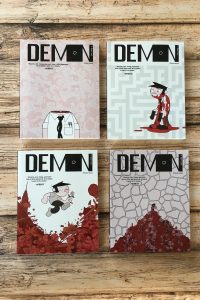Five Golden Things – Andy Duncan
Teachable Science Fiction and Fantasy
For the past decade, in the Honors College of the University of Alabama, I have taught a weekly interdisciplinary seminar on 21st-century science fiction and fantasy: science fiction in the fall, fantasy in the spring. In fact, it’s generally more limited even than the 21st century; my rule is to include no text on the syllabus older than five years. I break the rule occasionally, when I feel like it – and who’s to stop me? – but the consistent goal is a vivid iPhone snapshot of an ever-evolving contemporary genre, and not a dusty museum tour of artifacts under glass.
That’s the pedagogical reason for my rule, but there are selfish reasons as well. It keeps me from getting bored, frankly; it also forces me to keep up with at least some current reading, even when I’m not on an awards jury.
So scores of texts have shuttled in and out of my course: novels, multiple-author anthologies, single-author collections, movies, TV shows. All are good, in my opinion, though sometimes I include a text I’m not sure of, just to see what the students make of it. Still, some of them go over better with students than others. Here are five of the books that have worked especially well for me in multiple semesters, in alphabetical order by author.
The Windup Girl — Paolo Bacigalupi
I do not assign this the first week; we work up to it over two-thirds of the semester. Even so, some students have trouble with its imaginative density, its uncompromising darkness, its violence, its politics: anti-corporate, non-American (as opposed to un- or anti-American). Yet the students who initially complain the loudest wind up writing papers about some aspect of the book. It troubles them; it plucks at their sleeves; it tells them something urgent. The best books to teach tend to have multiple entry points (character, plots, styles, themes), and Bacigalupi’s is rife with them. An entire class could be spent on the first page, a beautiful example of the uniquely immersive experience that science fiction provides when extrapolation, setting, and language work in concert.
Stories of Your Life and Others — Ted Chiang
This is the first-week selection, and what better introduction to current sf can be imagined? Chiang’s short fiction is the state of the art. I assign his more recent work, too, such as The Lifecycle of Software Objects – in fact, all Chiang’s fiction to date is on my syllabus – but every story in this brilliant collection becomes some student’s favorite story of the semester. An underappreciated quality of sf is its play-along-at-home factor, and Chiang’s fiction is especially interactive. If I don’t stop them (and why would I?), students can spend entire class meetings debating the virtues of heptapod time over human time (in “Story of Your Life”) or whether they would undergo the calli procedure themselves (in “Liking What You See: A Documentary”).
Jonathan Strange and Mr Norrell — Susanna Clarke
When I first put this marvelous immensity on my fantasy syllabus, more than one cynical colleague said, “You can assign it, but you can’t make them read it.” I spread the discussion over multiple weeks, and the enthusiasm of the students who do all the talking the first week inspires their classmates to catch up, to see what the fuss is about. History buffs and Jane Austen fans are first adopters – since Clarke’s is the epic fantasy Austen would have written – but everybody finds something to obsess over, from the mysterious alternate narration unfolding in the footnotes to who ideally should be cast in the movie. One student, a David Bowie fanatic, became such a passionate authority on the Gentleman with the Thistle-Down Hair that I half expected her to disappear into Lost Hope, never to return. My students also were deeply impressed by the guest lecture from my English Department colleague Heather White. She had read the novel a half-dozen times, and it showed.
Magic for Beginners — Kelly Link
This is the brilliant single-author fantasy collection that balances Chiang’s brilliant single-author sf collection, and I often start the fantasy semester with it because it forces the students to confront their own preconceptions of fantasy. Students may not immediately grasp precisely what Link is doing, but it’s instantly clear that she is not doing J.R.R. Tolkien, George R.R. Martin, or J.K. Rowling. Listening to 15 smart undergraduates vocalize their experiences of Link’s “The Hortlak”, with increasing excitement, never gets old; it’s like being present at the discovery of a new land. (I should add that in my fiction-writing classes, the best writers tend to be transformed by exposure to Link; the stories they write afterward are so much stranger, more personal, more interesting.)
The Best Science Fiction and Fantasy of the Year (current volume) — Jonathan Strahan.
All the year’s-best volumes are great for displaying the field’s variety, for presenting veterans and newcomers side by side, and for giving students the chance to eavesdrop on the current conversations (and quarrels) playing out in the fiction. In my seminar, I think Strahan has the edge simply because his broad mandate allows him to choose more stories that blur the genre boundaries, and prompt more class discussions about why certain stories qualify as genre at all.
Andy Duncan is a writer and professor. He has won two World Fantasy Awards and his latest collection is The Pottawatomie Giant and Other Stories




Pingback:Jonathan Strange and Mr Norrell: a Book & TV Show Review - WriterAlina